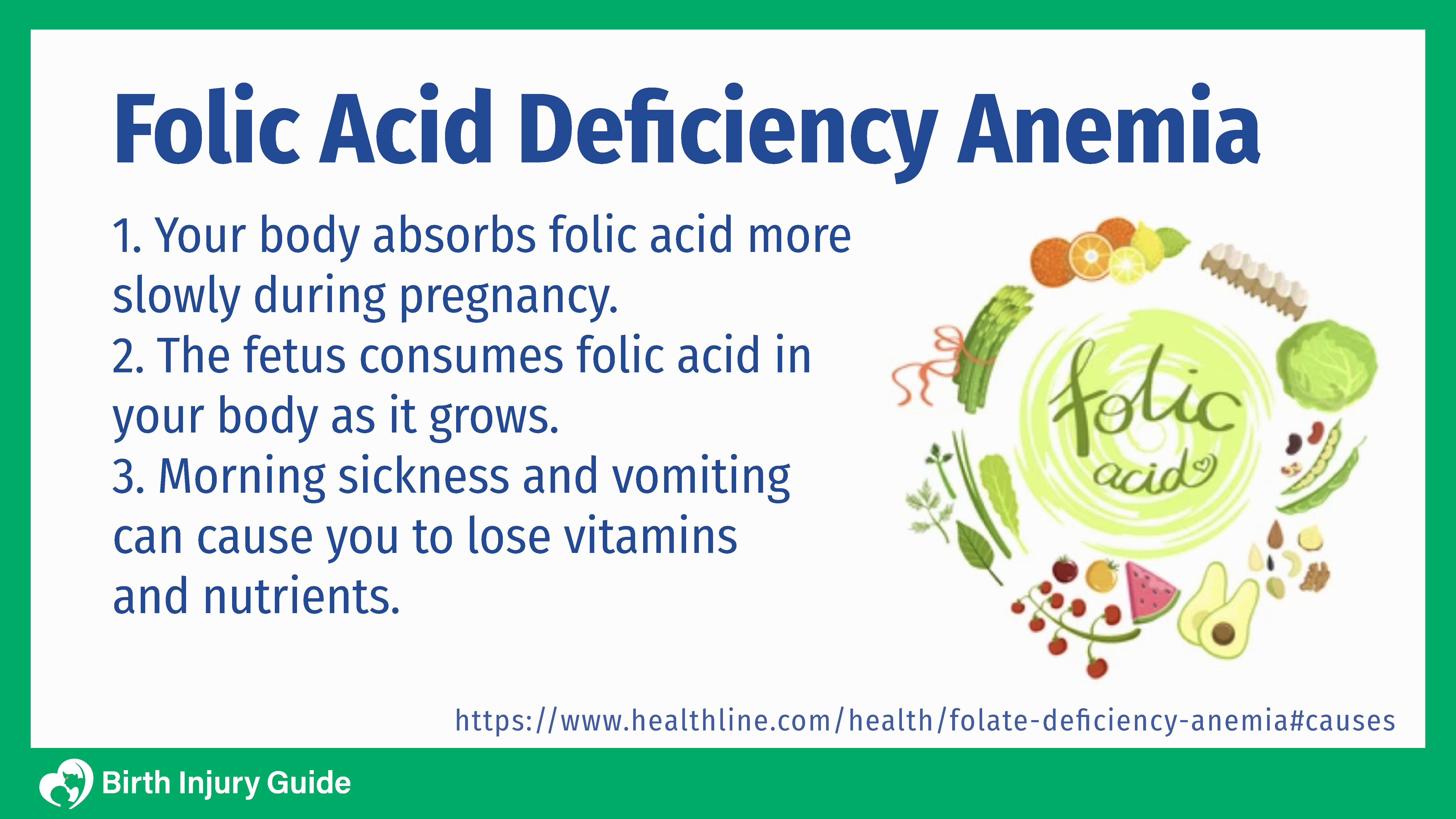
Folic Acid Deficiency Anemia
Folic acid deficiency anemia, or folate deficiency anemia, occurs when there is a lack of folic acid in the blood. Folic acid is a type of B vitamin that helps the body produce red blood cells. It also helps make and repair DNA. If your body lacks an adequate amount of red blood cells, you become anemic. Red blood cells are incredibly important to the body. They are the cells that carry oxygenated blood throughout the body, including to the vital organs. Without enough oxygenated blood, the body and organs cannot function like they should. This can lead to a host of medical problems, including organ dysfunction or failure.
Folic acid deficiency anemia, and generally a lack of red blood cells, is not as common in the United States as it once was. With medical advances and easy access to folic acid-rich foods, most pregnant women in the U.S. can easily avoid deficiency as long as they are informed on how it occurs and how to avoid it. Although rare, folic acid deficiency still occurs, and if left untreated, can lead to medical issues for both mother and baby.
What is Folic Acid Deficiency?
Folic acid deficiency, also referred to as folate deficiency, is a term defined as low levels of folic acid in the body. Folate is also called vitamin B9, or appears as folic acid in foods. Women can become deficient when there is not enough folic acid in their system. This can usually be remedied by eating a variety of foods that contain folic acid and/or by taking folic acid supplements. Almost all prenatal vitamins contain folic acid, and many women will take additional supplements during pregnancy. Since the body doesn’t store folic acid, it has to be restored daily, or the risk of deficiency occurs.
Folic acid deficiency anemia happens when the body doesn’t have enough folic acid to produce red blood cells. Without this important nutrient, women can become anemic or the baby can be at risk for birth defects, including a neural tube defect (spinal bifida).
Complications
While many people can regulate folate or folic acid levels with supplements, there are some possible complications of folate deficiency. These are most common when the deficiency is not recognized or corrected in a timely manner.
The possible complications include:
- Megaloblastic Anemia, a condition when red blood cells are larger than normal and develop abnormally.
- Low white blood cells and platelets
- Increased risk of heart disease or cancer
- Worsening of heart disease
- Birth defects in fetuses
- Placental abruption
- Premature birth
- Low birth weight
- Infertility
In the worst cases, folate deficiency can cause birth defects or serious complications of pregnancy. Placental abruption, for example, can cause heavy bleeding in the mother, and can be fatal for the infant.
What Causes It?
Folic acid deficiency can occur at any time, yet it typically occurs while pregnant. During pregnancy, the folic acid in the mother’s body is first used to support the growing infant, and if there isn’t enough folic acid leftover, the mother may become deficient. This can happen during the early weeks of pregnancy, potentially even before the woman knows that she is pregnant. That is why experts recommend that women of childbearing age be aware of their folic acid levels and take supplements before and during pregnancy.

Folate is water-soluble, which means that it dissolves and is not stored in the body in fat cells. Since your body can’t keep a reserve, you have to constantly replenish folate. Generally speaking, the causes of folic acid deficiency and anemia include:
Diet
People who eat a diet low in fortified cereals, vegetables and fruits are at risk for folate deficiency. Overcooking food can also deplete any vitamins. A poor diet can cause folate levels to deplete in a matter of weeks.
Disease
Medical conditions associated with folic acid deficiency include Crohn’s disease, thalassemia, celiac disease, and sickle cell anemia. Morning sickness has also been linked to some cases of folic acid deficiency, especially when pregnant women experience daily vomiting.
Genetics
Some people have genetic factors that cause them to be folate deficient. Genetic mutations can hinder the body from converting dietary or supplemental folate into the usable form. Folate needs to be converted into methylfolate in order for the body to get the benefits of the vitamin.
Side Effects of Medication
Certain medications can lead to folate deficiency, including:
- Dilantin
- Methotrexate
- Sulfasalazine
- Trimethoprim-sulfamethoxazole
Alcohol Intake
Alcohol disrupts normal folate absorption in the body. Excessive alcohol intake can cause folate deficiency rather rapidly, partially due to increased urination. The body excretes folate through urine.
What are the Symptoms of Folic Acid Deficiency Anemia?
The symptoms of folic acid deficiency are generally subtle and many people don’t immediately know that is the cause of their discomfort. The most common symptoms that people experience include:
- Fatigue
- Mouth sores
- Tongue swelling
- Growth problems
- Gray hair
Anemia symptoms are generally a bit more obvious, and may cause more discomfort. In pregnant women, many symptoms are related to the reduced amount of oxygen to the body caused by anemia. In turn, many women will experience oxygen deprivation symptoms such as:
- Extreme tiredness
- Weakness
- Breathlessness
- Feeling faint
- Headaches
- Heart palpitations
- Tinnitus
- Pale appearance
- Irritability
Pregnant women who experience these symptoms should talk to their doctor. Recognizing anemia and treating it quickly is important to prevent possible complications or birth defects.
How is Folic Acid Deficiency Diagnosed?
If your doctor suspects that you are folate deficient, they will likely order a blood test. Many doctors take routine blood tests during prenatal visits, and folate is one of the vitamins that they check. Ask your doctor about your folate levels or any other levels that you might be concerned about. If you want to check your folate levels in between appointments, you can also order an at-home kit.
Treatment of Folic Acid Deficiency Anemia
For adults, the most common treatment for folate deficiency is supplementation. That may include taking medication supplements and/or increasing dietary folic acid intake. Doctors recommend taking folic acid tablets for up to four months until the anemia resolves. Not everyone can be treated so easily, however. For example, people who have the MTHFR genetic mutation need to take methylated folate in order to prevent or treat anemia. Also, patients who have sickle cell disease may have to take the folic acid tablets indefinitely to treat and prevent anemia.
The University of Maryland Medical Center (UMMC) suggests that pregnant women should take extra folic acid each day to accommodate a growing baby. For example, an adult female who isn’t pregnant should get at least 400 mcg of folic acid each day, while a pregnant woman should get at least 600 mcg. Women who are breastfeeding should get 500 mcg per day.
Babies born with folic acid deficiency anemia should be carefully assessed by a doctor. Treatment for babies with this condition could range anywhere from a special diet to treating any defects or injuries caused by folic deficiency, such as physical therapy, medication and more, depending upon the injury.
How to Prevent Folic Acid Deficiency
Doctors and pediatricians should recommend that pregnant and nursing mothers eat plenty of healthy foods that are high in folate. Some examples of folate-rich foods that are easy to incorporate into your diet include:
Legumes
Legumes like beans, lentils and peas are high in folate. One cup of cooked kidney beans, for example, has 131 mcg of folate. That is around 33% of the recommended daily intake, or daily value. Cooked lentils offer even more folate – around 350 mcg for a one cup serving. That is 90% of the daily value. In addition to folate, legumes are also high in other important nutrients like fiber, protein and antioxidants. They also have micronutrients like iron and potassium, which are important during pregnancy.
Asparagus
Asparagus has a high concentration of several important vitamins and minerals, including folate. A half-cup serving contains around 130 mcg of folate, which is 34% of the daily value. Asparagus also has anti-inflammatory properties and is rich in antioxidants. It has heart-healthy fiber equivalent to around 6% of the daily value.
Eggs
Adding or increasing the amount of eggs you have in your diet is a great way to increase your folate intake. One large egg has 22 mcg of folate, or 6% of the daily value. Adding even a few eggs per week to your diet can help up your folate intake and prevent anemia. Eggs also have several other benefits, especially during pregnancy. They are rich in protein and vitamin B12, selenium, lutein and other antioxidants.
Leafy Greens
Leafy greens like spinach and kale are great sources of folate and other nutrients. One cup of raw spinach, for example, has 58 mcg of folate, or 15% of the daily value. Leafy greens are also rich in vitamins A and K and fiber. Eating a diet that is rich in these greens can also reduce inflammation and the risk of certain diseases and cancer.
Beets
Beets are something that many people shy away from due to their color, texture and being unsure of how best to prepare them. Even so, there are many health benefits to adding beets to your diet. Beets contain potassium, vitamin C and manganese. A cup of raw beets also contains 148 mcg of folate, which is 37% of the daily value! Beets are also high in nitrates, which can have many benefits on your health, including possibly lowering blood pressure.
Citrus
Not only is citrus delicious, it is also very healthy. Grapefruit, oranges, limes and lemons are all rich sources of folate. One large orange has around 55 mcg of folate, which is 14% of the daily value. Citrus also has a lot of vitamin C, which boosts the immune system and helps fight off illness.
Cruciferous Vegetables
Cruciferous vegetables like broccoli, cabbage, brussels sprouts and kohlrabi are also high in vitamins and minerals. Brussels sprouts in particular are especially high in folate. One half-cup of cooked brussels sprouts has around 47 mcg of folate, or 12% of the daily value. One cup of raw broccoli has around 57 mcg of folate. Cooked broccoli has even higher amounts, as much as 84 mcg for a half-cup serving.
Cruciferous vegetables are also high in kaempferol, a powerful antioxidant. Kaempferol has many health benefits including reducing inflammation and preventing oxidative damage.
Doctors recommend preparing leafy greens, broccoli and green beans by steaming rather than frying. Most of these foods have a higher level of folic acid if they are steamed in a proper food steamer because this preserves as many vitamins in the food as possible. A well-balanced diet should already contain all of these essential vitamins, but if you’re recovering from folic acid deficiency, these foods are especially important.
Nuts and Seeds
Nuts and seeds are a great way to increase your folate intake, especially during snack time. Nuts and seeds are high in folate, protein, fiber and many vitamins. The amount of folate in each type of nut and seed varies. Among those rich in folate are walnuts, which contain around 28 mcg per serving (one ounce), or 7% of the daily value. Flax seeds contain around 24 mcg per serving, or 6% of the daily value.
Beef Liver
Beef liver has one of the highest concentrations of folate per serving of any food. A 3-ounce serving of beef liver (cooked) has 212 mcg of folate, or 54% of the daily value. One serving of beef liver can also meet your daily intake of vitamins A and B12 and copper. It also has 24 grams of protein per serving.
Prognosis
The prognosis for an adult with folic acid deficiency anemia is generally favorable. Most adults recover from anemia in three to six months. The best way to improve the prognosis is to identify the cause (i.e. diet, medications, pregnancy, etc.) and find a suitable way to increase folic acid intake. For women who are pregnant, the prognosis is also generally favorable, but we must be cautious of possible complications that can also affect the infant.
As mentioned above, and according to the American Journal of Clinical Nutrition, infants who are deficient in folic acid are at a heightened risk for a number of medical complications. \
The complications that can certainly impact your prognosis include:
- Low birth weight
- Neural tube defects
- Nervous system damage
- Stillbirth
- Brain damage
Therefore, it is important to address any signs of folic acid deficiency in pregnant women, nursing mothers and infants. For infants, brain damage caused by folic acid deficiency can lead to more serious health problems, including conditions like cerebral palsy.
Start Your FREE Case Review Today
If you or your child is injured as a result of medical negligence, call us to learn more.
Sources:
- https://umm.edu/health/medical/altmed/supplement/vitamin-b9-folic-acid
- http://www.webmd.com/a-to-z-guides/folic-acid-deficiency-anemia-topic-overview
- https://www.cdc.gov/ncbddd/folicacid/recommendations.html
- https://medlineplus.gov/ency/article/000551.htm
- https://www.healthline.com/nutrition/foods-high-in-folate-folic-acid



